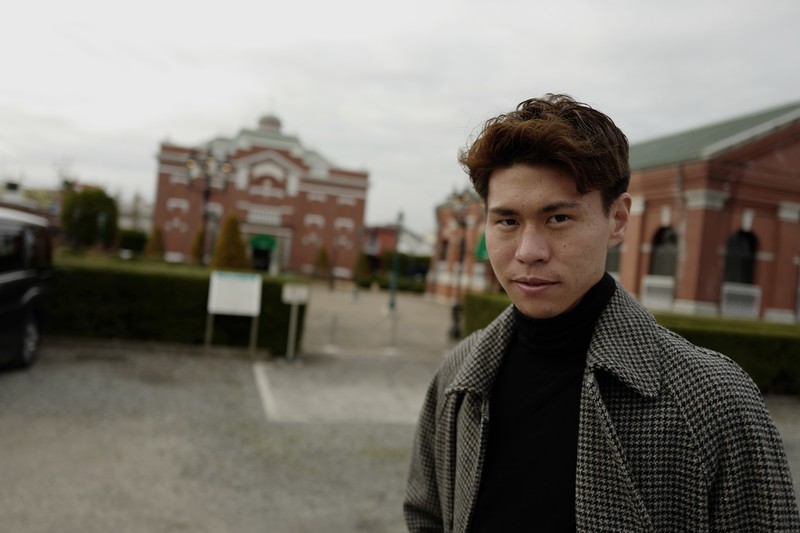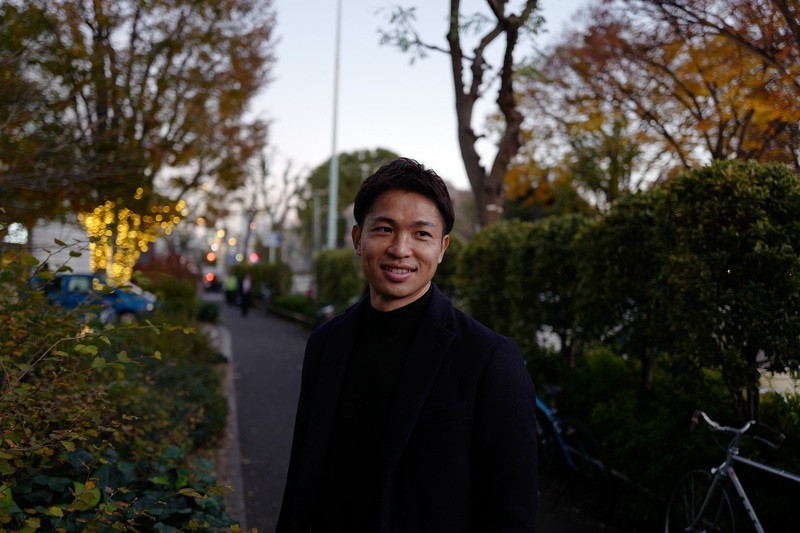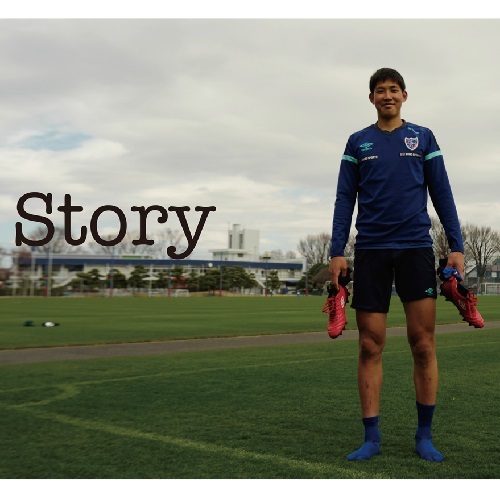Turned my back to the tower lit in orange, that day, I set out on a journey that I couldn't turn back from.
I have been taught the path to follow by the milestones I have encountered on my journey, and I have continued to survive.
And so, without a scenario, step into uncharted territory.
The never-ending journey of TOKYO's new icon continues in a city overlooked by trees.
The journey is halfway, Kento Hashimoto's final destination is still ahead.
Unending Aspiration
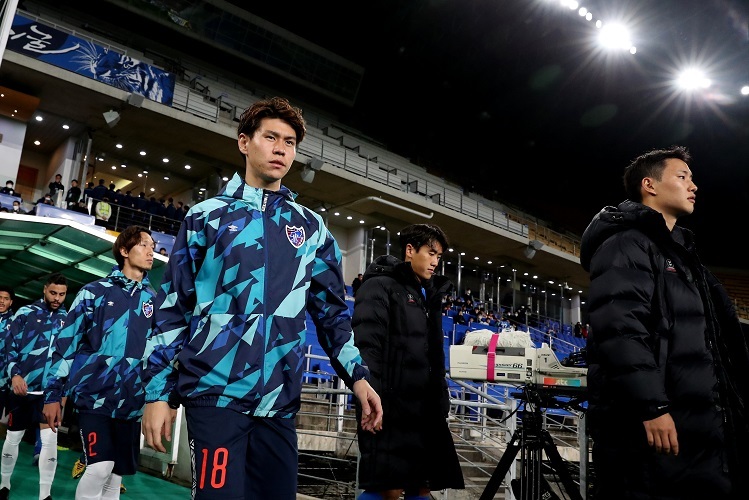
- Looking back on your career so far, have you not grown significantly every time you were faced with a wall?
"I have always tried to objectively look at myself and search for what I should do to survive. When I was in high school, I felt limited in my scoring ability as a FW. In that situation, Robert (Hisao KURAMATA / then U-18 coach) converted me to a midfielder, which became a turning point for me. My playing style also changed from there."
――"What did you think when you were asked to play as a defensive midfielder?"
"As soon as I converted, I thought, 'I might become my position.' There was also timing. When I was stuck, I was relieved to be able to do it for the first time when I was a midfielder. It was a skillful play to take the ball from the opponent since FW. In the midfield, I realized that I could do it very well. From now on, I thought it would be a big thing to be able to make my ball-taking ability my strength."
――That conversion opened the way to the pros. However, I didn't immediately grab a position on the top team.
"I started accompanying the top team's practice since my third year of high school, but there were amazing players in the same position. Even in plays where I thought I was good at stealing the ball, I felt like I couldn't compete with Yone-kun (Takuji YONEMOTO) or Konno (Yasuyuki KONNO). That's when I may have lost some confidence."
- At times like that, I would catch my senior or coach and often ask for advice.
"It's nostalgic. I have always accepted people's advice sincerely. There were many amazing players and wonderful coaches around me. Of course, I learned from watching them and if there was something I didn't understand, I would ask and turn it into my own strength. It was a process of repetition. Even now, I sometimes watch and incorporate the training that Morige-kun (Masato MORISHIGE) does, and if the younger players are doing interesting training, I will not hesitate to ask. I have a curious personality, so my spirit of wanting to try new things has not changed."
Do you ever get asked for advice from younger players, like you used to be?
"It may be few. But if there is someone who has had an unusual experience nearby, don't you want to hear about it? If we can learn what kind of thoughts and actions the players who have achieved results have had, we may be able to get closer even a little. This applies not only to soccer, but also to various fields. I would like to hear from people in different fields. I still have a desire to learn new things and gain motivation and knowledge."
Why do you never lose the desire to grow more?
"I wasn't originally a talented player. I thought that if I didn't absorb something from others or learn, I wouldn't be able to make it in this world. I have always felt the need to constantly grow. When I first turned pro, I only had the feeling of wanting to do it. But in my first and second year, I couldn't play in any games and I realized that this wasn't going to work. In order to become a good player, I have to continue to steal the good things from others. Since I started thinking that I need to change my mindset, I think I have become more eager for growth. I have tried to challenge and absorb everything. By doing so, I have gradually gained a sense of growth and confidence. I think that is still continuing today."
When you look back on the path you have taken, where do you think was the turning point?
"Of course, my first year as a professional was like that, and looking back, there were many turning points. When I was on loan to Roasso Kumamoto, and when I couldn't play in Tokyo after returning, it was the same. So many things happened that it's difficult to narrow it down to just one."
Unbelievable Basic Training
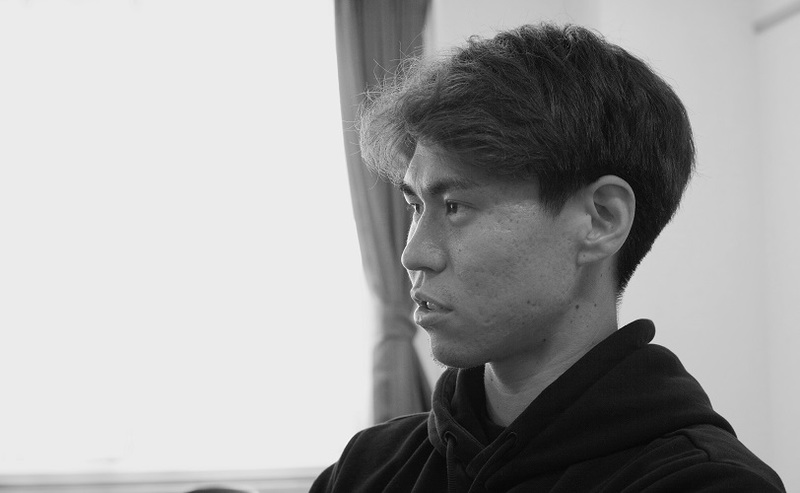
- Can you take a little time and look back on each one? First, it's training in Kumamoto, right?
"At that time, I had completely lost my confidence. I had almost forgotten what kind of player I was. I didn't even know what I could do and what I couldn't do because I wasn't playing in any games. By continuing to play in games, I was able to remember my strengths. I played about 60 games in a year and a half, mostly as a defensive midfielder or center back. I was able to get into the cycle of preparing for games every week and it became ingrained in my body. Everything was a new experience in Kumamoto."
- I think the fear of lowering the category was always there.
"There was a lot going on. I still remember it, but I cried on the flight there. It felt like a last stand. At the time, Kumamoto was a team that was even in a low position in J2. Perhaps the fear of it becoming a one-way ticket was always right next to me. Still, I didn't have a choice. I was sent off with the message to go because I didn't have a place in Tokyo. I thought that if I didn't succeed here, I wouldn't be able to go back and I was mentally prepared for that. Leaving Tokyo and living on my own were both new experiences for me. In a place where no one knew me, it felt like a big challenge for a teenager like myself."
- There, it must have been a big deal to meet players who fought with gritted teeth, right?
"I had the opportunity to meet players with experience like Kitaji (Hidarishima Hidero), (Fujimoto) Shuzai, and Yuta Minami, and we talked about soccer thoroughly. I received a lot of advice and I think I had a good time pursuing soccer. Above all, the training was hard, so it was a place where I could feel growth in various aspects."
- I think the confidence gained in Kumamoto was significant.
"When my first season ended and I was told to come back to Tokyo, I didn't have the confidence and asked to stay in Kumamoto for another year. By the end of my second year, I had gained more game experience and physical strength, and I came back with the confidence that I could make it. However, I didn't get to play at all. Outside of the red and white game, I was just playing ball with Mr. Amma (Takayoshi Amma/current coach). It was tough. My heart was about to break and my motivation was fading. But I learned so much from practicing with Mr. Amma at that time. He taught me from scratch what I was lacking and made me realize many things. I couldn't play in the red and white game, but I think it was a valuable time for me."
- The sight of starting over with basic training at the edge of the Kodaira ground left a lasting impression.
"Mr. Anma speaks very directly, doesn't he? (laughs) With a serious face, he said, 'You're really bad. With plays like this, the stands will sigh.' Every time I made a mistake, he would say, 'Okay, sigh,' in his unique way. Even so, I continued to accumulate repetitive practice calmly. I think there are players who would feel like saying, 'Don't mess with me' when spoken to like that. There might have been a feeling of 'I'll show you.' But more than that, I felt gratitude. It's rare to find someone who can tell you straight that something is bad. I realized that I couldn't notice those things myself, so I thought that if I could improve on that, I could become a better player. It was thanks to Mr. Anma that I could think, 'This is where my potential lies.' I often practiced with Wataru SASAKI (currently with Kamatamare Sanuki), and while first-year Wataru was praised a lot, I was being criticized right next to him. That's why I was able to focus on practice, knowing there were areas I needed to improve. Mr. Anma also joined me for extra practice, and the time we spent together watching a lot of footage and facing our challenges was invaluable."
- I think it's amazing that we continued that plain practice for months instead of just a few months.
"I think the most important thing is feeling that I have improved. I realized that such fundamentals are important. From an outsider's perspective, they might think, 'What kind of practice is that?' There were even menus where we just kicked the ball face to face. Even now, in order to regain my sense, I review the training from back then. That's how important the training was."
How to Change Your Life Without Having It
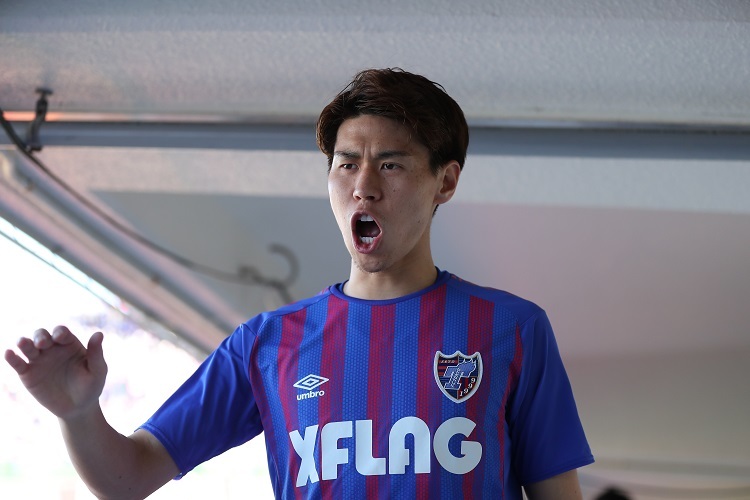
- And, I was able to produce results immediately when given the chance. The J1 debut match against Matsumoto Yamaga F.C. is a memorable game.
"That was really big. There were a lot of injured players, and it was my first time playing as a left MF, which is not my usual position. I was really nervous about playing in that position for the first time. But at that moment, I was so focused on scoring because I knew I had to do it or there would be no next chance. I was completely in the zone. I wasn't thinking about anything else but scoring. I knew that I couldn't break into the team's hierarchy with just a few good plays, so I went into the game with the mindset that I only needed to score."
It was also a game where I was simply surprised whether the player who had once been branded as FW disqualified would score a goal in that important scene.
"It was my first start, first appearance, first shot, and first goal in J1 (laughs). Until then, I thought I didn't have it. But in that game, I felt that what I had been working on would come back to me."
- Even if it takes more time than others, I have been steadily attracting opportunities. I will continue to walk this career path.
"If I hadn't put in the effort, my life would have been "empty" forever. If you continue to do what you need to do, it may not happen right away. But it will definitely come back to you someday. I believed in that and kept going."
- Yoshito OKUBO, who was on the team during the 2017 season, was constantly told to make vertical passes during the game.
"The one who made me aware of the importance of verticality was definitely Mr. Yoshito. It allowed me to see things that I couldn't see before. During the game, he would tell me in detail where I should be focusing on, saying 'now here, now here'. I thought it was something I lacked and needed to work on. Mr. Yoshito's experience and knowledge are truly amazing. There were times when he would speak harshly to me, but looking back, I am grateful for it as it helped me grow. I always accepted it with an open mind."
Why can we be so honest about soccer?
"I think it's because when I was young, I received advice from others and absorbed their experiences to grow. Without realizing it, it became a habit, so I started to accept it first. Therefore, there are always areas for improvement, such as wanting to improve here and wanting to make this better. This is only possible because I analyze myself. I am always thinking about how I can grow, and there are also people around me who look at me with a critical eye. Recently, I have been wanting to further polish my strengths."
- Last season, he was also selected for the Japan national team. I think it's the result of continuous hard work up until now.
"When I joined the Japan national team, I felt that the hard work I had been doing paid off. (Masaru HASEGAWA) Kenji-san became the coach and being fixed in the defensive midfield was also a turning point. However, the previous coaches who used me in various positions were also a big help. It was necessary for me to have that experience. I think that experiencing various positions is now helping me expand my playing range."
- This is my 10th year as a professional. I have been constantly striving to grow, where do you see yourself aiming for?
"I absolutely want to go to the World Cup. I also have a desire to challenge overseas clubs. The higher I go, the more I feel the desire to go even higher. On the other hand, it also makes me realize that I still have a long way to go."
- Some players are satisfied to a certain extent, but why do you think that is not the case?
"I definitely don't want to become like that. I don't think I'll ever say 'I'm done' or 'this is good enough' in my life. Maybe going to Kumamoto was a big factor in that mindset. At that time, there was no J3 and if I couldn't make it in a lower J2 club, I might have to give up my career as a professional soccer player. Seeing that place made me want to climb up and aim higher. I think that experience was significant."
Endless Journey

- What kind of place is the Club World Cup, which I have had little connection with in my career so far?
"It's a dream. I watched the 2002 Japan-Korea World Cup and thought I definitely wanted to play here. There is still a lot to do and it's not easy to qualify for the World Cup. When I think about competing against the world, I need to improve my growth rate even more. 1 or 2 years will pass in the blink of an eye and before I know it, it will be over."
- Can you imagine yourself performing on the stage of the World Cup?
"I am ready. I want to compete with the world on equal terms or better. I want to show my skills at the World Cup and prove my strength on that stage. Every day, the things I can do are limited. In that limited time, I must make the maximum effort or I will not reach my goal. It is important to do what I have to do, and to always have the image of fighting in the world. I want to continue to be conscious of that."
- When you think about it, do you tend to get lost in your own world and lose sight of your surroundings?
"There have been things that seemed to be like that since last year. Honestly, there are times when I just want to focus on myself. However, since it is a team sport, I think it is very important to communicate with everyone. I am not the type to lead with my voice, so I want to show my play firmly and I think that is what I can do. I try to separate my own thoughts from the team's. I think I have become able to find a good balance and not be swayed by emotions."
Is getting married a big deal?
"Getting married doesn't change my mindset to work hard in soccer. I've always been working hard in soccer and that won't change. However, I am receiving a lot of support, so if I can play well or if the team achieves good results, my wife will be happy. I want to show her my hard work and express my gratitude as much as possible."
――15 years ago, the young soccer player who entered Ajinomoto hand in hand with Naohiro Ishikawa CC, now stands on the same pitch as an adult. It would be interesting if a younger player like myself appeared.
"I still have a vivid memory of when I entered holding hands with Nao-san, I was so happy. Every time we hold hands, I feel that emotion. Maybe one day I'll kick a ball with this child. Nao-san also told me that there might be a player who can play together like that."
- - Those two number 18s also surprised me by scoring goals on October 19, 2011 and October 19, 8 years later.
"That was exhilarating. I didn't think something like that could happen. When I took over the number 18, it was really heavy. But recently, I've started to feel like it's my own number."
――Finally, what kind of year do you want this season to be?
"First of all, I want to maximize my individual abilities throughout the year. As a team, we want to win the J1 League and AFC Champions League titles. In order to do that, I want to be a player who can bring victories to the team. Because I have grown up in the academy, I believe I have more attachment to this team than anyone else. I believe that by leading the team, such players can definitely become stronger."
◇Kento HASHIMOTO Profile
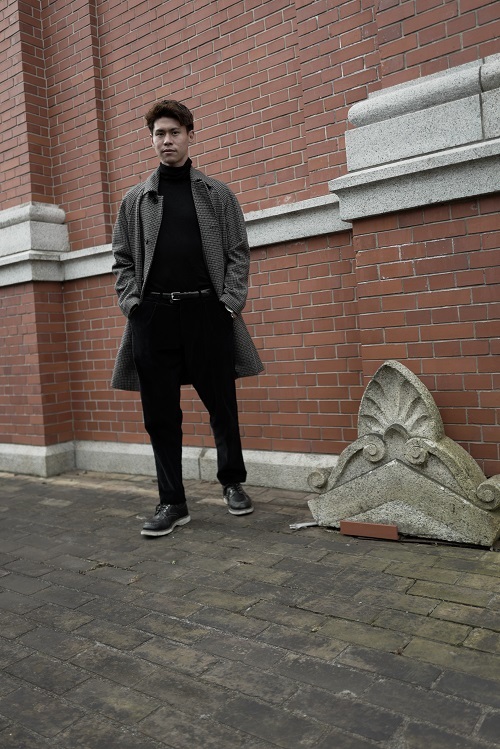
text by Kohei Baba
photo by Kenichi Arai,Masahito Sasaki
